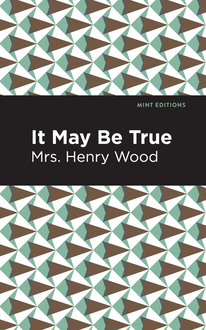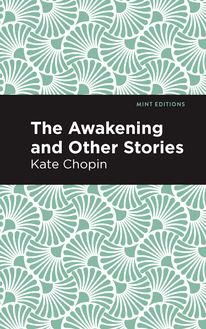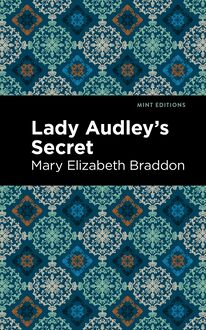-
 Univers
Univers
-
 Ebooks
Ebooks
-
 Livres audio
Livres audio
-
 Presse
Presse
-
 Podcasts
Podcasts
-
 BD
BD
-
 Documents
Documents
-
- Cours
- Révisions
- Ressources pédagogiques
- Sciences de l’éducation
- Manuels scolaires
- Langues
- Travaux de classe
- Annales de BEP
- Etudes supérieures
- Maternelle et primaire
- Fiches de lecture
- Orientation scolaire
- Méthodologie
- Corrigés de devoir
- Annales d’examens et concours
- Annales du bac
- Annales du brevet
- Rapports de stage
La lecture à portée de main
Vous pourrez modifier la taille du texte de cet ouvrage
Découvre YouScribe en t'inscrivant gratuitement
Je m'inscrisDécouvre YouScribe en t'inscrivant gratuitement
Je m'inscrisEn savoir plus
Vous pourrez modifier la taille du texte de cet ouvrage
En savoir plus

Description
Originally published in Robin Goodfellow magazine, Lady Audley's Secret is the essential work of Mary Elizabeth Braddon and is considered a staple of sensation fiction. The story centers on a mysterious woman, whose dark past slowly comes to light.
Lady Audley is a former governess who marries the wealthy widower, Sir Michael Audley. She thoroughly enjoys the life of privilege and status associated with her new husband. Although she appears beautiful and polished, Lady Audley is more than meets the eye. She has a dark secret that could jeopardize everything she’s worked for. To maintain her façade, she plots and schemes to silence those who threaten her happiness. Lady Audley will stop at nothing to maintain her comfortable lifestyle, including murder.
Lady Audley is driven by desperation and fear. Her outlandish behavior leads to an unpredictable narrative taking the reader on a journey full of twists and turns. A combination of melodrama, crime and romance, Lady Audley's Secret is an extreme commentary on Victorian gender and class.
With an eye-catching new cover, and professionally typeset manuscript, this edition of Lady Audley's Secret is both modern and readable.
Sujets
Informations
| Publié par | Mint Editions |
| Date de parution | 01 décembre 2020 |
| Nombre de lectures | 0 |
| EAN13 | 9781513273570 |
| Langue | English |
| Poids de l'ouvrage | 3 Mo |
Informations légales : prix de location à la page 0,0500€. Cette information est donnée uniquement à titre indicatif conformément à la législation en vigueur.
Extrait
Lady Audley’s Secret
Mary Elizabeth Braddon
Lady Audley’s Secret was first published in 1862.
This edition published by Mint Editions 2021.
ISBN 9781513268576 | E-ISBN 9781513273570
Published by Mint Editions®
MintEditionBooks.com
Publishing Director: Jennifer Newens
Design & Production: Rachel Lopez Metzger
Typesetting: Westchester Publishing Services
C ONTENTS 1. L UCY 2. O N B OARD THE A RGUS 3. H IDDEN R ELICS 4. I N THE F IRST P AGE OF “T HE T IMES ” 5. T HE H EADSTONE AT V ENTNOR 6. A NYWHERE , A NYWHERE O UT OF THE W ORLD 7. A FTER A Y EAR 8. B EFORE THE S TORM 9. A FTER THE S TORM 10. M ISSING 11. T HE M ARK U PON M Y L ADY ’ S W RIST 12. S TILL M ISSING 13. T ROUBLED D REAMS 14. P HOEBE ’ S S UITOR 15. O N THE W ATCH 16. R OBERT A UDLEY G ETS HIS C ONGE 17. A T THE C ASTLE I NN 18. R OBERT R ECEIVES A V ISITOR W HOM H E H AD S CARCELY E XPECTED 19. T HE W RITING IN THE B OOK 20. M RS . P LOWSON 21. L ITTLE G EORGEY L EAVES H IS O LD H OME 22. C OMING TO A S TANDSTILL 23. C LARA 24. G EORGE ’ S L ETTERS 25. R ETROGRADE I NVESTIGATION 26. S O F AR AND N O F ARTHER 27. B EGINNING AT THE O THER E ND 28. H IDDEN IN THE G RAVE 29. I N THE L IME -W ALK 30. P REPARING THE G ROUND 31. P HOEBE ’ S P ETITION 32. T HE R ED L IGHT IN THE S KY 33. T HE B EARER OF THE T IDINGS 34. M Y L ADY T ELLS THE T RUTH 35. T HE H USH THAT S UCCEEDS THE T EMPEST 36. D R . M OSGRAVE ’ S A DVICE 37. B URIED A LIVE 38. G HOST -H AUNTED 39. T HAT W HICH THE D YING M AN H AD TO T ELL 40. R ESTORED 41. A T P EACE
Chapter 1
L UCY
I t lay down in a hollow, rich with fine old timber and luxuriant pastures; and you came upon it through an avenue of limes, bordered on either side by meadows, over the high hedges of which the cattle looked inquisitively at you as you passed, wondering, perhaps, what you wanted; for there was no thorough-fare, and unless you were going to the Court you had no business there at all.
At the end of this avenue there was an old arch and a clock tower, with a stupid, bewildering clock, which had only one hand—and which jumped straight from one hour to the next—and was therefore always in extremes. Through this arch you walked straight into the gardens of Audley Court.
A smooth lawn lay before you, dotted with groups of rhododendrons, which grew in more perfection here than anywhere else in the county. To the right there were the kitchen gardens, the fish-pond, and an orchard bordered by a dry moat, and a broken ruin of a wall, in some places thicker than it was high, and everywhere overgrown with trailing ivy, yellow stonecrop, and dark moss. To the left there was a broad graveled walk, down which, years ago, when the place had been a convent, the quiet nuns had walked hand in hand; a wall bordered with espaliers, and shadowed on one side by goodly oaks, which shut out the flat landscape, and circled in the house and gardens with a darkening shelter.
The house faced the arch, and occupied three sides of a quadrangle. It was very old, and very irregular and rambling. The windows were uneven; some small, some large, some with heavy stone mullions and rich stained glass; others with frail lattices that rattled in every breeze; others so modern that they might have been added only yesterday. Great piles of chimneys rose up here and there behind the pointed gables, and seemed as if they were so broken down by age and long service that they must have fallen but for the straggling ivy which, crawling up the walls and trailing even over the roof, wound itself about them and supported them. The principal door was squeezed into a corner of a turret at one angle of the building, as if it were in hiding from dangerous visitors, and wished to keep itself a secret—a noble door for all that—old oak, and studded with great square-headed iron nails, and so thick that the sharp iron knocker struck upon it with a muffled sound, and the visitor rung a clanging bell that dangled in a corner among the ivy, lest the noise of the knocking should never penetrate the stronghold.
A glorious old place. A place that visitors fell in raptures with; feeling a yearning wish to have done with life, and to stay there forever, staring into the cool fish-ponds and counting the bubbles as the roach and carp rose to the surface of the water. A spot in which peace seemed to have taken up her abode, setting her soothing hand on every tree and flower, on the still ponds and quiet alleys, the shady corners of the old-fashioned rooms, the deep window-seats behind the painted glass, the low meadows and the stately avenues—ay, even upon the stagnant well, which, cool and sheltered as all else in the old place, hid itself away in a shrubbery behind the gardens, with an idle handle that was never turned and a lazy rope so rotten that the pail had broken away from it, and had fallen into the water.
A noble place; inside as well as out, a noble place—a house in which you incontinently lost yourself if ever you were so rash as to attempt to penetrate its mysteries alone; a house in which no one room had any sympathy with another, every chamber running off at a tangent into an inner chamber, and through that down some narrow staircase leading to a door which, in its turn, led back into that very part of the house from which you thought yourself the furthest; a house that could never have been planned by any mortal architect, but must have been the handiwork of that good old builder, Time, who, adding a room one year, and knocking down a room another year, toppling down a chimney coeval with the Plantagenets, and setting up one in the style of the Tudors; shaking down a bit of Saxon wall, allowing a Norman arch to stand here; throwing in a row of high narrow windows in the reign of Queen Anne, and joining on a dining-room after the fashion of the time of Hanoverian George I, to a refectory that had been standing since the Conquest, had contrived, in some eleven centuries, to run up such a mansion as was not elsewhere to be met with throughout the county of Essex. Of course, in such a house there were secret chambers; the little daughter of the present owner, Sir Michael Audley, had fallen by accident upon the discovery of one. A board had rattled under her feet in the great nursery where she played, and on attention being drawn to it, it was found to be loose, and so removed, revealed a ladder, leading to a hiding-place between the floor of the nursery and the ceiling of the room below—a hiding-place so small that he who had hid there must have crouched on his hands and knees or lain at full length, and yet large enough to contain a quaint old carved oak chest, half filled with priests’ vestments, which had been hidden away, no doubt, in those cruel days when the life of a man was in danger if he was discovered to have harbored a Roman Catholic priest, or to have mass said in his house.
The broad outer moat was dry and grass-grown, and the laden trees of the orchard hung over it with gnarled, straggling branches that drew fantastical shadows upon the green slope. Within this moat there was, as I have said, the fish-pond—a sheet of water that extended the whole length of the garden and bordering which there was an avenue called the lime-tree walk; an avenue so shaded from the sun and sky, so screened from observation by the thick shelter of the over-arching trees that it seemed a chosen place for secret meetings or for stolen interviews; a place in which a conspiracy might have been planned, or a lover’s vow registered with equal safety; and yet it was scarcely twenty paces from the house.
At the end of this dark arcade there was the shrubbery, where, half buried among the tangled branches and the neglected weeds, stood the rusty wheel of that old well of which I have spoken. It had been of good service in its time, no doubt; and busy nuns have perhaps drawn the cool water with their own fair hands; but it had fallen into disuse now, and scarcely any one at Audley Court knew whether the spring had dried up or not. But sheltered as was the solitude of this lime-tree walk, I doubt very much if it was ever put to any romantic uses. Often in the cool of the evening Sir Michael Audley would stroll up and down smoking his cigar, with his dogs at his heels, and his pretty young wife dawdling by his side; but in about ten minutes the baronet and his companion would grow tired of the rustling limes and the still water, hidden under the spreading leaves of the water-lilies, and the long green vista with the broken well at the end, and would stroll back to the drawing-room, where my lady played dreamy melodies by Beethoven and Mendelssohn till her husband fell asleep in his easy-chair.
Sir Michael Audley was fifty-six years of age, and he had married a second wife three months after his fifty-fifth birthday. He was a big man, tall and stout, with a deep, sonorous voice, handsome black eyes, and a white beard—a white beard which made him look venerable against his will, for he was as active as a boy, and one of the hardest riders in the country. For seventeen years he had been a widower with an only child, a daughter, Alicia Audley, now eighteen, and by no means too well pleased at having a step-mother brought home to the Court; for Miss Alicia had reigned supreme in her father’s house since her earliest childhood, and had carried the keys, and jingled them in the pockets of her silk aprons, and lost them in the shrubbery, and dropped them into the pond, and given all manner of trouble about them from the hour in which she entered her teens, and had, on that account, deluded herself into the sincere belief, that for the whole of that period, she had been keeping the house.
But Miss Alicia’s day was over; and now, when she asked anything of the housekeeper, the housekeeper would tell her that she would speak to my lady, or she would consult my lady, and if my lady pleased it sho
-
 Univers
Univers
-
 Ebooks
Ebooks
-
 Livres audio
Livres audio
-
 Presse
Presse
-
 Podcasts
Podcasts
-
 BD
BD
-
 Documents
Documents
-
Jeunesse
-
Littérature
-
Ressources professionnelles
-
Santé et bien-être
-
Savoirs
-
Education
-
Loisirs et hobbies
-
Art, musique et cinéma
-
Actualité et débat de société
-
Jeunesse
-
Littérature
-
Ressources professionnelles
-
Santé et bien-être
-
Savoirs
-
Education
-
Loisirs et hobbies
-
Art, musique et cinéma
-
Actualité et débat de société
-
Actualités
-
Lifestyle
-
Presse jeunesse
-
Presse professionnelle
-
Pratique
-
Presse sportive
-
Presse internationale
-
Culture & Médias
-
Action et Aventures
-
Science-fiction et Fantasy
-
Société
-
Jeunesse
-
Littérature
-
Ressources professionnelles
-
Santé et bien-être
-
Savoirs
-
Education
-
Loisirs et hobbies
-
Art, musique et cinéma
-
Actualité et débat de société
- Cours
- Révisions
- Ressources pédagogiques
- Sciences de l’éducation
- Manuels scolaires
- Langues
- Travaux de classe
- Annales de BEP
- Etudes supérieures
- Maternelle et primaire
- Fiches de lecture
- Orientation scolaire
- Méthodologie
- Corrigés de devoir
- Annales d’examens et concours
- Annales du bac
- Annales du brevet
- Rapports de stage



















